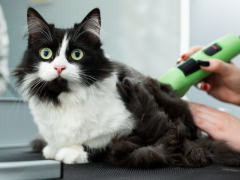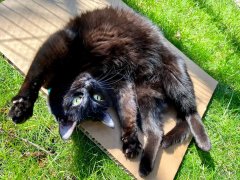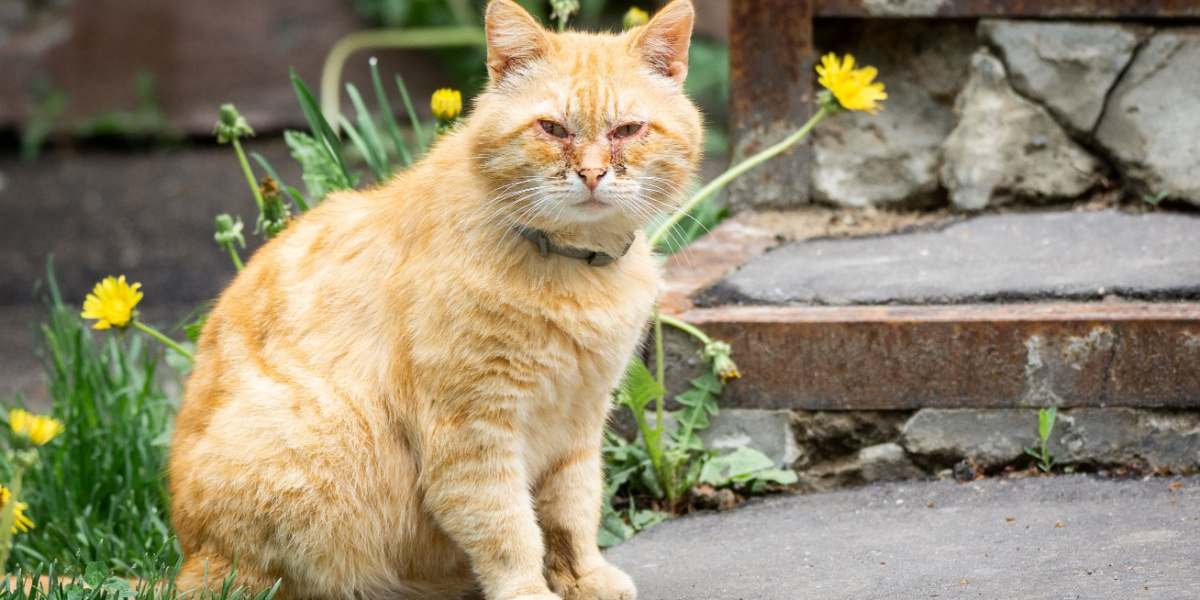
Shutterstock.com
Famciclovir is a human antiviral medication, which is also used in cats for the treatment of feline herpesvirus type-1 (FHV-1). It’s used off-label in cats and comes in tablet form. It can cause some side effects, such as vomiting or diarrhea, but these are relatively uncommon and often mild.
This article will explain how famciclovir works, the common dosages used, how to administer it to your cat, and some common side effects.
Famciclovir For Cats Overview

- 125 mg
- 250 mg
- 500 mg
About Famciclovir for Cats
Famciclovir is a human medication that is often used in veterinary medicine to treat cats with symptoms of feline herpes virus. Its use in cats is off-label: meaning that it isn’t licensed for cats, but it can be used when recommended and prescribed by a veterinarian.
Famciclovir works by interfering with the DNA replication of herpesvirus, thus preventing it from replicating. Preventing the virus from multiplying will reduce viral shedding from the virus and also reduce the symptoms of herpesvirus for cats.
Herpesvirus makes up part of the condition that we know of as ‘cat flu’. The clinical signs of herpesvirus in cats include:
- Sneezing
- Congestion
- Nasal discharge
- Conjunctivitis
- Eye (corneal) ulcers
- Fever
- Reduced appetite
Although famciclovir doesn’t cure herpesvirus, it can help reduce the symptoms of the virus. This may improve the quality of life of cats that are chronically affected by herpesvirus symptoms.
Dosage for Cats
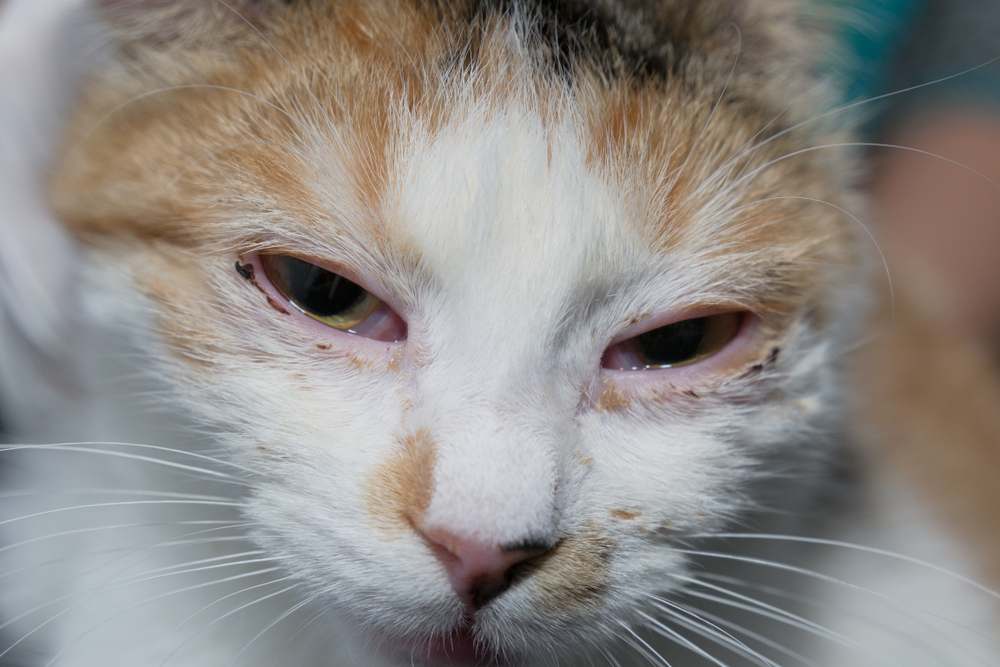
The specific dose of famciclovir for your cat will depend on their weight, but also on the severity of their symptoms, such as eye ulceration or respiratory signs. Shutterstock.com
The dosage for famciclovir can vary a lot depending on the severity of the cat’s clinical symptoms. Your vet may decide on trialing your cat on a lower dose if the symptoms are mild, or a higher dose if the symptoms are severe.
In general, the dose of famciclovir for cats is based on their weight, at 40–90mg/kg, every 8–12 hours. The tablets are usually administered for 2–3 weeks but may be given longer in severe cases. Your vet will decide what dosage is suitable for your cat.
How To Administer Famciclovir to Cats
Famciclovir comes in tablet form, with three different doses: 125mg, 250mg, and 500mg. These tablets are to be administered orally. This can be done with or without food. Your cat may take the oral administration of famciclovir tablets in their food, hidden in a normal tasty treat, or a special pill pocket treat.
For cats that won’t take the tablet in food, it may need to be given by hand—gently and safely. If pilling your cat is tricky, consider using a pilling device or wrapping your kitty in a towel to stabilize them.
If you’re having extreme difficulty giving tablets to your cat, contact your vet for advice. They may have tips or other options, such as compounding the medicine into a liquid form if necessary.
Side Effects of Famciclovir for Cats
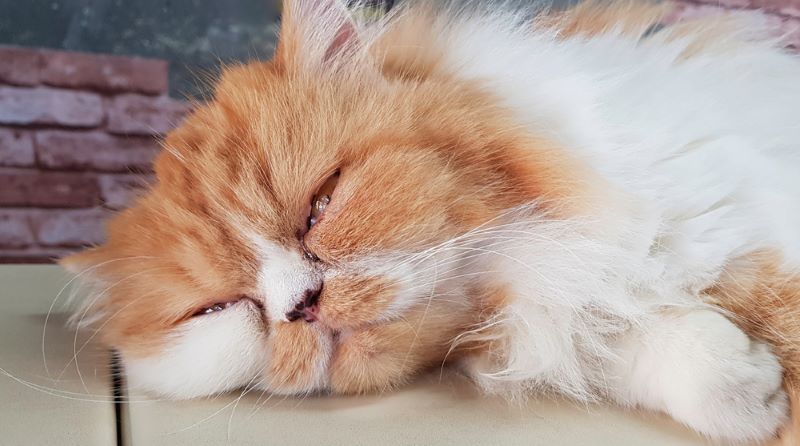
Side effects are often mild, but can include gastrointestinal symptoms such as loss of appetite or vomiting. Shutterstock.com
Not all cats who take famciclovir will develop side effects, as it’s relatively well tolerated. However, the most common side effects include:
- Decreased appetite
- Vomiting
- Diarrhea
- Increased drinking
If your cat develops any of these side effects or any other adverse reaction, you should contact your veterinarian right away. They may want you to discontinue famciclovir if the symptoms are significant.
Famciclovir should be used with caution in cats that have kidney disease or are pregnant or nursing. It should be avoided in cats that have known hypersensitivity to famciclovir, penciclovir, or related drugs. Side effects may be more severe if famciclovir is used in these cases.
Overdose and Emergencies
If you think your cat has overdosed on famciclovir, contact your veterinarian or an emergency vet clinic immediately.
You can also ring the ASPCA Animal Poison Control Center (1-888-426-4435) or Pet Poison Helpline (1-855-764-7661) for more information.
Potential Drug Interactions With Famciclovir
Some drugs interact with famciclovir when used in humans. Many of these aren’t commonly used in veterinary medicine, however, it is best to be cautious when starting famciclovir. Your vet will check if famciclovir is appropriate to be used alongside any other medicines that your cat is currently on.
Be sure to tell your veterinarian if you are giving any supplements or vitamins that they may not know about.
How to Store Famciclovir
Famciclovir should be stored in a child-proof container, away from moisture or sunlight. It should be stored at room temperature (68–77°F or 20–25°C).
Pay close attention to expiration dates and discard any medication that has expired.
Drug Dosing Disclaimer: We are only able to provide doses for medications that are FDA approved for use in cats and only as the label guidelines dictate. For medications that are used off-label we can only provide guidelines and safety information for use. Safe and appropriate dosing for off-label medications can only be determined by a primary care veterinarian.
We encourage you to work with your veterinarian to determine if a particular medication is appropriate for your cat. Changing or adjusting a dose for your cat on your own without consulting with a veterinarian can carry risk. We do not encourage use of medications prescribed for human use in pets without first consulting with a primary care veterinarian.
Frequently Asked Questions
Is famciclovir safe for cats?
Yes, famciclovir is relatively safe and well tolerated in cats. It can have some side effects in rare cases, such as an upset stomach, reduced appetite, and increased drinking. Always contact your vet if you’re concerned that your cat is experiencing side effects.
What if I miss a dose of famciclovir?
If you miss a dose of famciclovir, contact your veterinarian for advice on how to proceed. They may advise you to give the dose if you’re still within a certain time frame. If too much time has passed, they may advise you to wait until the next dose is due. Never overdose or double dose.
How long can cats take famciclovir?
Cats usually take famciclovir for 2–3 weeks but some vets may prescribe it for a longer period.
How long does it take for famciclovir to work in cats?
Famciclovir will start working after several doses. However, the full effects may not be seen until 1–3 weeks after starting therapy.
Should cats take famciclovir with food?
Famciclovir can be given with or without food. You can try giving it to your cat in a tasty treat or mixing it in with some of their wet food.




